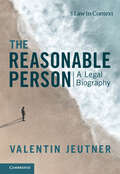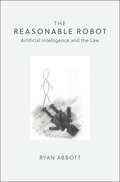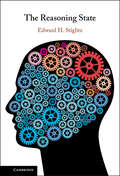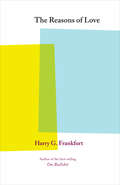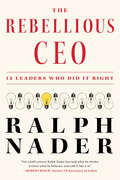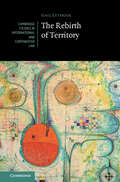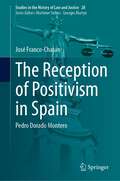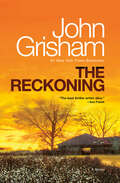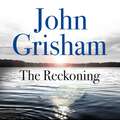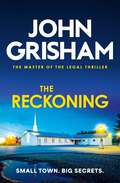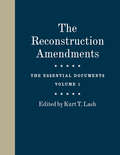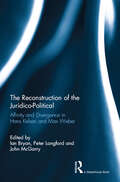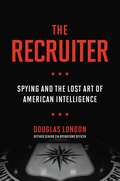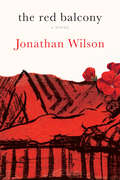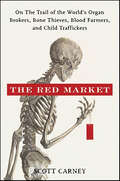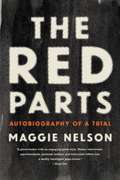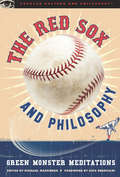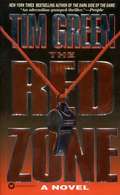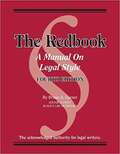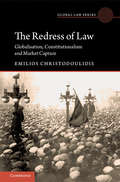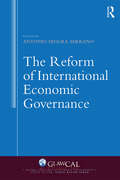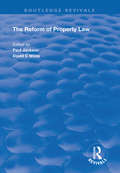- Table View
- List View
The Reasonable Person: A Legal Biography (Law in Context)
by Valentin JeutnerJeutner argues that the reasonable person is, at heart, an empathetic perspective-taking device, by tracing the standard of the reasonable person across time, legal fields and countries. Beginning with a review of imaginary legal figures in the legal systems of ancient Egypt, Greece, and Rome, the book explains why the common law's reasonable person emerged amidst the British industrialisation under the influence of Scottish Enlightenment thinking. Following the figure into colonial courts, onto battlefields and into self-driving cars, the book contends that the reasonable person invites judges, jury-members, and lawyers to take another person's perspective when assessing their own or another person's conduct. The perspective of another is taken by means of empathy, by feeling what others might feel in a particular situation. Thus construed, the figure of the reasonable person can help us make more accurate judgments in a diverse world.
The Reasonable Robot: Artificial Intelligence and the Law
by Ryan AbbottToday, artificial intelligence (AI) and people do not compete on a level playing field. From a safety perspective, AI may be the best choice for driving a vehicle, but laws often prohibit driverless vehicles. At the same time, a person may be better at packing boxes at a warehouse, but a business may automate because AI receives preferential tax treatment. Or, AI may be better at helping businesses to innovate, but these same businesses may not want to use AI if doing so restricts future intellectual property rights. In The Reasonable Robot, Ryan Abbott argues that the law should not discriminate between people and AI when they are performing the same tasks, a legal standard that will help to eliminate market distortions and to ensure that decisions are made on the basis of efficiency. This work should be read by anyone interested in the rapidly evolving relationship between AI and the law.
The Reasoning State
by Edward H. StiglitzAdministrative bodies, not legislatures, are the primary lawmakers in our society. This book develops a theory to explain this fact based on the concept of trust. Drawing upon Law, History and Social Science, Edward H. Stiglitz argues that a fundamental problem of trust pervades representative institutions in complex societies. Due to information problems that inhere to complex societies, the public often questions whether the legislature is acting on their behalf—or is instead acting on the behalf of narrow, well-resourced concerns. Administrative bodies, as constrained by administrative law, promise procedural regularity and relief from aspects of these information problems. This book addresses fundamental questions of why our political system takes the form that it does, and why administrative bodies proliferated in the Progressive Era. Using novel experiments, it empirically supports this theory and demonstrates how this vision of the state clarifies prevailing legal and policy debates.
The Reasons of Love
by Harry G. FrankfurtFrom the author of the #1 New York Times bestseller On Bullshit, a profound meditation on how and why we loveIn The Reasons of Love, leading moral philosopher and bestselling author Harry Frankfurt argues that the key to a fulfilled life is to pursue wholeheartedly what one cares about, that love is the most authoritative form of caring, and that the purest form of love is, in a complicated way, self-love. Through caring, we infuse the world with meaning. Caring provides us with stable ambitions and concerns, and it shapes the framework of aims and interests within which we lead our lives. Love is a nonvoluntary, disinterested concern for the flourishing of what we love—and self-love, as distinct from self-indulgence, is at heart of this concern. The most elementary form of self-love is no more than the desire to love, and self-love is simply a commitment to finding meaning in our lives.
The Rebellious CEO: 12 Leaders Who Did It Right
by Ralph NaderOne of corporate America's greatest foes shows how 12 CEOs he has known uniquely rejected narrow yardsticks of shareholder value by leading companies to larger models of prosperity and justiceOver the course of 7 decades Ralph Nader has been Corporate America&’s fiercest critic. Supreme Court Justice William Powell singled out Nader in his infamous memo as the &“single most effective antagonist of American business… [the] target of his hatred… is corporate power.&”But now, in a book that will surprise both his fans and critics, Nader profiles a small group of CEOs who he believes performed extraordinarily well as business leaders and civic reformers, some well-known, some not, who should be celebrated as exceptions whose life and career should be a course of emulation and inspiration for students of business, executives and the wider citizenry. This select group of mavericks and iconoclasts — which includes The Body Shop&’s Anita Roddick, Patagonia&’s Yvon Chouinard, Vanguard&’s John Bogle and Busboys and Poets' Andy Shallal —give us, Nader writes, &“a sense of what might have been and what still could be if business were rigorously framed as a process that was not only about making money and selling things but improving our social and natural world.&”
The Rebirth of Territory (Cambridge Studies in International and Comparative Law)
by Gail LythgoeThe concept of territory is central in international law, but a detailed analysis of how the concept is used in both discourse and practice has been lacking until now. Rather than reproducing the established understanding of territoriality within the international legal order, this study suggests that the discipline of international law relies on an outmoded spatial paradigm. Gail Lythgoe argues for a complete update and overhaul of our understanding of territory and space, to engage more effectively with key processes, structures and actors relevant to contemporary global governance. In this new theoretical account of an essential aspect of public international law, she argues that territory is a dynamic social reality created by the exercise of power. Territories are constituted by the practices of a more diverse array of actors than is acknowledged. As a result, functions are re-assembling in territories constituted by state and non-state actors alike.
The Reception of Aristotle's Ethics
by Jon MillerAristotle's ethics are the most important in the history of Western philosophy, but little has been said about the reception of his ethics by his many successors. The present volume offers thirteen newly commissioned essays covering figures and periods from the ancient world, starting with the impact of the ethics on Hellenistic philosophy, taking in medieval, Jewish and Islamic reception and extending as far as Kant and the twentieth century. Each essay focuses on a single philosopher, school of philosophers, or philosophical era. The accounts examine and compare Aristotle's views and those of his heirs and also offer a reception history of the ethics, dealing with matters such as the availability and circulation of Aristotle's texts during the periods in question. The resulting volume will be a valuable source of information and arguments for anyone working in the history of ethics.
The Reception of Positivism in Spain: Pedro Dorado Montero (Studies in the History of Law and Justice #28)
by José Franco-ChasánPedro Dorado Montero was one of Spain’s most relevant authors. He contributed to modern Criminal law and Penology with a very unique theory: the Protective Law for Criminals. In a time when neoclassical penal theories and new positivist theories clashed, Dorado Montero’s proposal served as a bridge between the criminal law conceptions of the 19th and 20th centuries.In order to explore his role in the introduction of positivism within Spain and the subsequent success of this trend, this book addresses several aspects. The first three analyzed are his scholarly career, the historical and international context in which he lived, and the various European and other international influences he was exposed to. On this basis, two major points are then discussed.Firstly, Dorado Montero has been traditionally included within the movement known as correccionalismo. However, his legal-philosophical and criminal thought indicates otherwise. It seems to lie closer to positivism than to neoclassical positions. This research aims at challenging the accuracy of the ‘eclectic’ label which traditional historiography has applied to him.In turn, Dorado Montero described a reality in which every moral value and legal representation was a mere product of mankind’s imagination. Man is responsible for the elaboration of morals, law and culture in his own mind. Thus, for him, there were as many moral and legal orders as there were human beings on the planet. Such a claim is polemic even today. Unsurprisingly, the author received criticism from both neoclassical and positivist schools. Thus, the existence of a ‘Doradian positivism’ is explored. Despite the growing interest in these topics over the last few decades, Dorado Montero has somehow been overlooked – even though his Derecho protector de los criminales described the criminal law of the future as well, one that will have to face the new neurological, medical, psychological and genetic challenges of our time.
The Reckoning: A Novel
by John Grisham#1 NEW YORK TIMES BESTSELLER • John Grisham's most powerful, surprising, and suspenseful thriller yet • &“A murder mystery, a courtroom drama, a family saga.&” —USA TodayOctober 1946, Clanton, Mississippi Pete Banning was Clanton, Mississippi&’s favorite son—a decorated World War II hero, the patriarch of a prominent family, a farmer, father, neighbor, and a faithful member of the Methodist church. Then one cool October morning he rose early, drove into town, and committed a shocking crime. Pete's only statement about it—to the sheriff, to his lawyers, to the judge, to the jury, and to his family—was: "I have nothing to say." He was not afraid of death and was willing to take his motive to the grave. In a major novel unlike anything he has written before, John Grisham takes us on an incredible journey, from the Jim Crow South to the jungles of the Philippines during World War II; from an insane asylum filled with secrets to the Clanton courtroom where Pete&’s defense attorney tries desperately to save him. Reminiscent of the finest tradition of Southern Gothic storytelling, The Reckoning would not be complete without Grisham&’s signature layers of legal suspense, and he delivers on every page.Don&’t miss John Grisham&’s new book, THE EXCHANGE: AFTER THE FIRM!
The Reckoning: The Sunday Times Number One Bestseller
by John GrishamThe electrifying new thriller from internationally bestselling author John Grisham.John Grisham returns to Clanton, Mississippi, to tell the story of an unthinkable murder, the bizarre trial that followed it, and its profound and lasting effect on the people of Ford County.Pete Banning was Clanton's favourite son, a returning war hero, the patriarch of a prominent family, a farmer, father, neighbour, and a faithful member of the Methodist Church. Then one cool October morning in 1946. he rose early, drove into town, walked into the church, and calmly shot and killed the Reverend Dexter Bell.As if the murder wasn't shocking enough, it was even more baffling that Pete's only statement about it - to the sheriff, to his defense attorney, to the judge, to his family and friends, and to the people of Clanton - was 'I have nothing to say'.And so the murder of the esteemed Reverend Bell became the most mysterious and unforgettable crime Ford County had ever known.Praise for Grisham's latest book, The Rooster Bar'Scintillating storytelling' - The Sunday Times'A buoyant, mischievous thriller . . . This reliable best-selling author is feeling real pleasure, and not just obligation, in delivering his work' - New York Times(P)2018 Random House Audio
The Reckoning: The Sunday Times Number One Bestseller
by John GrishamA SMALL TOWN. A BIG MURDER.A man is dead - and nobody knows why.One morning in 1946, Pete Banning - war hero, pillar of the community and faithful member of Clanton's Methodist Church - drives into town, walks into the church and calmly shoots Reverend Dexter Bell in cold blood.In the years following the murder, Banning's only statement is: 'I have nothing to say.' The sheriff, his defense attorney, the judge and his family and friends are all left in the dark.What drove this man to murder has haunted Clanton for decades - and now, a reckoning is coming...💥350+ million copies, 45 languages, 10 blockbuster films: JOHN GRISHAM IS THE MASTER OF THE LEGAL THRILLER💥 Readers are raving about The Reckoning: 'Epic!' ⭐ ⭐ ⭐ ⭐ ⭐ 'Excellent'⭐ ⭐ ⭐ ⭐ ⭐ 'John Grisham is a wonderful storyteller'⭐ ⭐ ⭐ ⭐ ⭐ 'Outstanding'⭐ ⭐ ⭐ ⭐ ⭐'A must read!' ⭐ ⭐ ⭐ ⭐ ⭐
The Reconstruction Amendments: The Essential Documents, Volume 1
by Kurt T. LashRatified in the years immediately following the American Civil War, the Thirteenth, Fourteenth, and Fifteenth Amendments to the U.S. Constitution—together known as the Reconstruction Amendments—abolished slavery, safeguarded a set of basic national liberties, and expanded the right to vote, respectively. This two-volume work presents the key speeches, debates, and public dialogues that surrounded the adoption of the three amendments, allowing us to more fully experience how they reshaped the nature of American life and freedom. Volume I outlines a broad historical context for the Reconstruction Amendments and contains materials related to the Thirteenth Amendment, which abolished slavery, while Volume 2 covers the Fourteenth and Fifteenth Amendments on the rights of citizenship and enfranchisement. The documents in this collection encompass a sweeping range of primary sources, from congressional debates to court cases, public speeches to newspaper articles. As a whole, the volumes meticulously depict a significant period of legal change even as they illuminate the ways in which people across the land grappled with the process of constitutional reconstruction. Filling a major gap in the literature on the era, The Reconstruction Amendments will be indispensable for readers in politics, history, and law, as well as anyone seeking a better understanding of the post–Civil War basis of American constitutional democracy.
The Reconstruction Amendments: The Essential Documents, Volume 1
by Kurt T. LashRatified in the years immediately following the American Civil War, the Thirteenth, Fourteenth, and Fifteenth Amendments to the U.S. Constitution—together known as the Reconstruction Amendments—abolished slavery, safeguarded a set of basic national liberties, and expanded the right to vote, respectively. This two-volume work presents the key speeches, debates, and public dialogues that surrounded the adoption of the three amendments, allowing us to more fully experience how they reshaped the nature of American life and freedom. Volume I outlines a broad historical context for the Reconstruction Amendments and contains materials related to the Thirteenth Amendment, which abolished slavery, while Volume 2 covers the Fourteenth and Fifteenth Amendments on the rights of citizenship and enfranchisement. The documents in this collection encompass a sweeping range of primary sources, from congressional debates to court cases, public speeches to newspaper articles. As a whole, the volumes meticulously depict a significant period of legal change even as they illuminate the ways in which people across the land grappled with the process of constitutional reconstruction. Filling a major gap in the literature on the era, The Reconstruction Amendments will be indispensable for readers in politics, history, and law, as well as anyone seeking a better understanding of the post–Civil War basis of American constitutional democracy.
The Reconstruction of the Juridico-Political: Affinity and Divergence in Hans Kelsen and Max Weber
by Peter Langford Ian Bryan John McGarryHans Kelsen and Max Weber are conventionally understood as the original proponents of two distinct and opposed processes of concept formation generating two separate and contrasting theoretical frameworks for the study of law. The Reconstruction of the Juridico-Political: Affinity and Divergence in Hans Kelsen and Max Weber contests the conventional understanding of the theoretical relationship between Kelsen’s legal positivism and Weber’s sociology of law. Utilising the conceptual frame of the juridico-political, the contributors to this interdisciplinary volume analyse central points of affinity and divergence in the work of these two influential figures. Thus, the chapters collected in The Reconstruction of the Juridico-Political offer a comprehensive reconsideration of these affinities and divergences, through a comparison of their respective reconstruction of the notions of democracy, the State, legal rights and the character of law. From this reconsideration a more complex understanding of their theoretical relationship emerges combined with a renewed emphasis upon the continued contemporary relevance of the work of Kelsen and Weber.
The Recovery of Non-Pecuniary Loss in European Contract Law (The Common Core of European Private Law)
by Vernon Valentine PalmerThis is the first comprehensive work to capture the rise of moral damages (non-pecuniary loss) in European contract law through a historical and comparative analysis. Unique features of this study include the first classification scheme of the systems into liberal, moderate and conservative regimes, a taxonomy of non-pecuniary loss drawn from a European-wide jurisprudence, and a comprehensive bibliography of the subject. Written by a leading academic on comparative law, Palmer's precise and practical insights on Europe's leading cases will be of great interest to academic researchers and practitioners alike. The first comprehensive study of non-pecuniary loss in European contract law. A broad comparative and historical perspective covering twelve countries and both civil law and common law traditions. Precise and practical insights focused on Europe's leading cases.
The Recruiter: Spying and the Lost Art of American Intelligence
by Douglas LondonThis revealing memoir from a 34-year veteran of the CIA who worked as a case officer and recruiter of foreign agents before and after 9/11 provides an invaluable perspective on the state of modern spy craft, how the CIA has developed, and how it must continue to evolve.If you've ever wondered what it's like to be a modern-day spy, Douglas London is here to explain. London&’s overseas work involved spotting and identifying targets, building relationships over weeks or months, and then pitching them to work for the CIA—all the while maintaining various identities, a day job, and a very real wife and kids at home.The Recruiter: Spying and the Lost Art of American Intelligence captures the best stories from London's life as a spy, his insights into the challenges and failures of intelligence work, and the complicated relationships he developed with agents and colleagues. In the end, London presents a highly readable insider&’s tale about the state of espionage, a warning about the decline of American intelligence since 9/11 and Iraq, and what can be done to recover.
The Red Balcony: A Novel
by Jonathan WilsonBased on actual events, a gripping novel of sex, love, history and justice in the tinderbox of British Mandatory Palestine, by the acclaimed author of A Palestine Affair"The story of what is arguably Israel&’s foundational murder trial—a tale of multiple identities and loyalties." —Joshua Cohen, Pulitzer-Prize-winning author of The Netanyahus It&’s 1933, and Ivor Castle, Oxford-educated and Jewish, arrives in Palestine to take up a position as assistant to the defense counsel in the trial of the two men accused of murdering Haim Arlosoroff, a leader of the Jewish community in Palestine whose efforts to get Jews out of Hitler&’s Germany and into Palestine may have been controversial enough to get him killed. While preparing for the trial, Ivor, an innocent to the politics of the case, falls into bed and deeply in love with Tsiona, a free-spirited artist who happened to sketch the accused men in a Jerusalem café on the night of the murder and may be a key witness. As Ivor learns the hard way about the violence simmering just beneath the surface of British colonial rule, Jonathan Wilson dazzles with his mastery of the sun-drenched landscape and the subtleties of the warring agendas among the Jews, Arabs, and British. And as he travels between the crime scene in Tel Aviv and the mazelike streets of Jerusalem, between the mounting mysteries surrounding this notorious case and clandestine lovemaking in Tsiona&’s studio, Ivor must discover where his heart lies: whether he cares more for the law or the truth, whether he is more an Englishman or a Jew, and where and with whom he truly belongs.
The Red Market: On the Trail of the World's Organ Brokers, Bone Thieves, Blood Farmers, and Child Traffickers
by Scott Carney“An unforgettable nonfiction thriller, expertly reported….A tremendously revealing and twisted ride, where life and death are now mere cold cash commodities.”—Michael Largo, author of Final ExitsAward-winning investigative journalist and contributing Wired editor Scott Carney leads readers on a breathtaking journey through the macabre underworld of the global body bazaar, where organs, bones, and even live people are bought and sold on The Red Market. As gripping as CSI and as eye-opening as Mary Roach’s Stiff, Carney’s The Red Market sheds a blazing new light on the disturbing, billion-dollar business of trading in human body parts, bodies, and child trafficking, raising issues and exposing corruptions almost too bizarre and shocking to imagine.
The Red Parts: Autobiography of a Trial
by Maggie NelsonLate in 2004, Maggie Nelson was looking forward to the publication of her book Jane: A Murder, a narrative in verse about the life and death of her aunt, who had been murdered thirty-five years before. The case remained unsolved, but Jane was assumed to have been the victim of an infamous serial killer in Michigan in 1969. Then, one November afternoon, Nelson received a call from her mother, who announced that the case had been reopened; a new suspect would be arrested and tried on the basis of a DNA match. <p><p> Over the months that followed, Nelson found herself attending the trial with her mother and reflecting anew on the aura of dread and fear that hung over her family and childhood--an aura that derived not only from the terrible facts of her aunt's murder, but also from her own complicated journey through sisterhood, daughterhood, and girlhood. <p> The Red Parts is a memoir, an account of a trial, and a provocative essay that interrogates the American obsession with violence and missing white women, and that scrupulously explores the nature of grief, justice, and empathy.
The Red Sox and Philosophy
by Michael MacomberThis volume in the Popular Culture and Philosophy series delves into the tragic and redemptive history of the Boston Red Sox baseball franchise. Drawing on philosophers from Aristotle to Sartre, chapters range from issues of faith and spirituality to tragedy, irony, existentialism, Sabermetrics, and the infamous "curse of the Bambino." With an emphasis on "Red Sox Nation" - the community of Red Sox fans across the globe - the book connects important philosophical ideas with one of the most storied teams in the history of Major League Baseball. The chapters make complex philosophical arguments easy to understand while providing an insider's knowledge of the hometown team. All but one of the authors in this volume are all Red Sox fans who comment on their team philosophically. There's even a Yankee fan's perspective! With a foreword by Dick Bresciani, vice president and official historian of the Boston Red Sox, this book provides a unique philosophical experience for the die-hard Red Sox fan.
The Red Zone
by Tim GreenThe owner of the NFL's Florida Marauders is dead, and the prime suspect is the Marauders' number-one player: big, restless, stylish Luther Zorn. The linebacker is guilty. But is he guilty of anything more than sleeping with his boss's wife? Enter Madison McCall. A high- priced, hard-driving defense attorney who's no stranger to the violent world of pro football players. She defends Zorn ... and plunges them both into a game far more dangerous than the one Zorn plays on Sunday afternoons. For here the opponents are invisible, and willing to murder anyone who gets in their way.
The Redbook: A Manual on Legal Style
by Bryan GarnerBryan A. Garner's Redbook: A Manual on Legal Style, 4th Edition (Coursebook)
The Redress of Law: Globalisation, Constitutionalism and Market Capture (Global Law Series)
by Emilios ChristodoulidisFrom a legal-philosophical point of view, The Redress of Law presents a critical analysis of a number of related doctrinal fields: constitutional, labour and EU Law. Focusing on the organisation and protection of work, this book asks what it means to protect work as an essential aspect of human (individual and collective) flourishing. This is an ambitious and highly sophisticated intervention in contemporary academic and political debates around a set of critically important questions connected to processes of globalisation and market integration. The author redefines the nature of legal and political thought in an age in which market rationality has exceeded its classic domain and has come to pervade the organization of social and political life. This restatement of critical legal theory is intended to defend the concept of constitutionalism and suggest new ways to deploy the law strategically.
The Reform of International Economic Governance (Global Law and Sustainable Development)
by Antonio Segura SerranoThe second half of the twentieth century saw the emergence of international economic law as a major force in the international legal system. This force has been severely tested by the economic crisis of 2008. Unable to prevent the crisis, the existing legal mechanisms have struggled to react against its direst consequences. This book brings together leading experts to analyse the main causes of the crisis and the role that international economic law has played in trying to prevent it, on the one hand, and worsening it, on the other. The work highlights the reaction and examines the tools that have been created by the international legal field to implement international cooperation in an effort to help put an end to the crisis and avoid similar events in the future. The volume brings together eminent legal academics and economists to examine key issues from the perspectives of trade law, financial law, and investment law with the collective aim of reform of international economic governance.
The Reform of Property Law (Routledge Revivals)
by Paul Jackson David C. WildeFirst published in 1997, this volume constitutes a collection of new papers by more than 20 United Kingdom and International experts on general and specific issues relating to the reform of all aspects of property law. Topics covered include the language of property law and the dangers of reform, the role of the Law Commission and the workings of Parliamentary procedures, registration of title to land, landlord and tenant, land pollution, mortgages, sale of goods, the Hague Convention on trusts, together with general comparative papers and papers dealing with specific issues of property law reform affecting Hong Kong, Ireland, Scotland and South Africa. The volume arises out of the successful conference 'The Reform of Property Law' hosted by the Centre for Property Law at The University of Reading in 1996.
